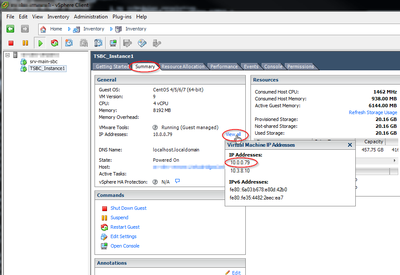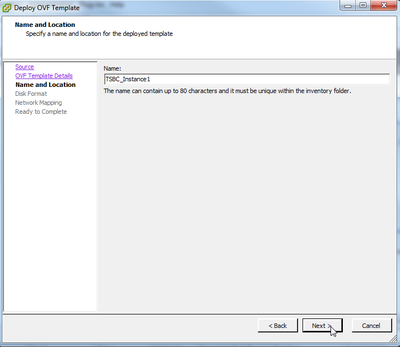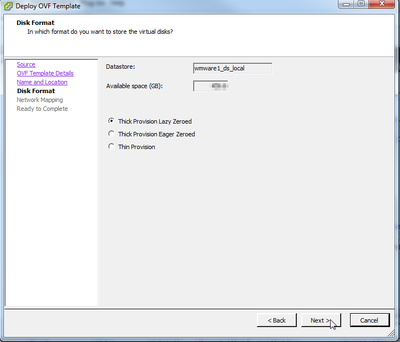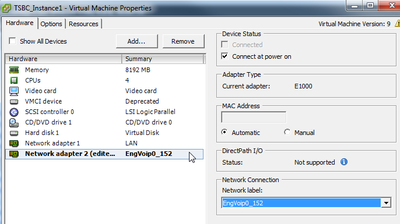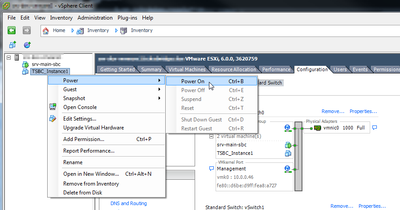TSBC-SW:Cloud:VmWare Launching Instance vSphere A
From TBwiki
(Difference between revisions)
(minor edits throughout the article) |
|||
| Line 1: | Line 1: | ||
| − | ==== Launching an instance the vSphere client ==== | + | ==== Launching an instance of the VMware vSphere client ==== |
| − | {{DISPLAYTITLE:FreeSBC:Cloud: | + | {{DISPLAYTITLE:FreeSBC:Cloud:Launching an Instance of VMware vSphere}} |
| − | #Log in using the Vmware infrastructure client interface <br/>[[File:login_client.png|200px]] | + | #Log in using the Vmware infrastructure client interface <br/>[[File:login_client.png|200px]]<br/> |
| − | #Select File->Deploy OVF Template | + | #Select File->Deploy OVF Template <br/>[[File:vmware_upload.png|400px]]<br/> |
| − | #Browse to the location of the FreeSBC image obtained from TelcoBridges <br/>[[File:vmware_ovf_location.png|400px]] | + | #Browse to the location of the FreeSBC image that you obtained from TelcoBridges <br/>[[File:vmware_ovf_location.png|400px]]<br/> |
| − | # Click 'Next' until you need to name the new virtual machine instance. Enter the name and click 'Next' <br/>[[File:vmware_name.png|400px]] | + | # Click 'Next' until you need to name the new virtual machine instance. |
| − | # Select a datastore (if more than one are available) | + | *Enter the name and click 'Next' <br/>[[File:vmware_name.png|400px]]<br/> |
| − | # Accept all other default settings and wait until the machine is deployed.<br/> [[File:vmware_installing.png|200px]] | + | # Select a datastore (if more than one are available) |
| − | # Once deployed, right-click on the new instance and select "Edit Settings..." <br/>[[File:vmware_settings.png|400px]] | + | *Select "Thick Provision Lazy Zeroed" as the disk format and click 'Next' <br/>[[File:vmware_disk.png|400px]]<br/> |
| − | # Press | + | # Accept all other default settings and wait until the machine is deployed.<br/>[[File:vmware_installing.png|200px]]<br/> |
| − | # Edit network adapters to connect | + | # Once the machine is deployed, right-click on the new instance and select "Edit Settings..." <br/>[[File:vmware_settings.png|400px]]<br/> |
| − | # | + | # Press 'OK' <br/>[[File:Vmware_restricted.png]]<br/> |
| − | # Select | + | # Edit network adapters to connect to the proper networks. Make sure that at least one of the adapters connects to the private management network of the setup from which WebPortal access will be granted. |
| − | # Select | + | Do '''not''' press 'OK' button. <br/>[[File:vmware_network.png|400px]]<br/> |
| − | # Select | + | # Click the 'Resources' tab and select CPU. |
| + | *Set 'Shares' to 'high' | ||
| + | *Slide the 'Reservation' cursor to the maximum (move to the right) | ||
| + | *Make sure the 'Unlimited' option is checked-marked. | ||
| + | Do '''not''' click the 'OK' button yet. <br/>[[File:vmware_cpu.png|400px]]<br/> | ||
| + | # Select 'Memory' and select the 'Reserve all guest memory (All locked)' option. | ||
| + | Do '''not''' click the 'OK' button yet. <br/>[[File:vmware_mem.png|400px]]<br/> | ||
| + | # Select 'Disk' and set the 'Shares' to 'High'. | ||
| + | Do '''not''' click the 'OK' button yet. <br/>[[File:vmware_disk_res.png|400px]]<br/> | ||
| + | # Select 'Advanced CPU' and set the 'Mode' to 'None'. | ||
| + | Do '''not''' click the 'OK' button yet. <br/>[[File:vmware_adv_cpu.png|400px]]<br/> | ||
# Set the 'Latency Sensitivity' to 'High' | # Set the 'Latency Sensitivity' to 'High' | ||
| − | # | + | # Click 'OK' |
| − | # | + | # Return to the main screen, and select the newly instantiated virtual machine. |
| − | # | + | *right-click and select "Power-->Power On" to start it. <br/>[[File:vmware_poweron.png|400px]]<br/> |
| + | # Return again to the main screen, and select the newly instantiated virtual machine and click the 'Summary' tab. Once the virtual machine is completed booted, the assigned DHCP IP address will be displayed by clicking on the 'View all' button. | ||
| + | Note this IP address to access the Web Portal configuration interface later. <br/>[[File:vmware_ip.png|400px]] | ||
Revision as of 13:49, 12 December 2018
Launching an instance of the VMware vSphere client
- Log in using the Vmware infrastructure client interface
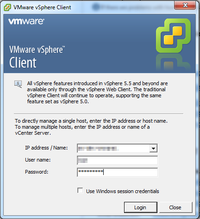
- Select File->Deploy OVF Template
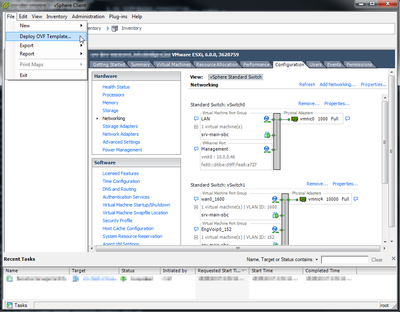
- Browse to the location of the FreeSBC image that you obtained from TelcoBridges
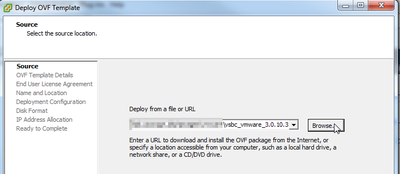
- Click 'Next' until you need to name the new virtual machine instance.
- Select a datastore (if more than one are available)
- Accept all other default settings and wait until the machine is deployed.

- Once the machine is deployed, right-click on the new instance and select "Edit Settings..."
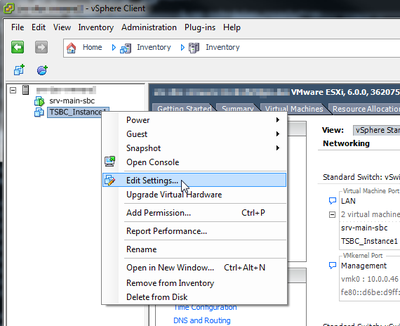
- Press 'OK'
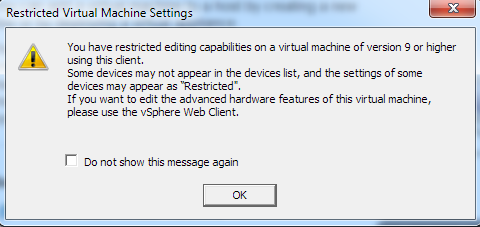
- Edit network adapters to connect to the proper networks. Make sure that at least one of the adapters connects to the private management network of the setup from which WebPortal access will be granted.
- Click the 'Resources' tab and select CPU.
- Set 'Shares' to 'high'
- Slide the 'Reservation' cursor to the maximum (move to the right)
- Make sure the 'Unlimited' option is checked-marked.
Do not click the 'OK' button yet. 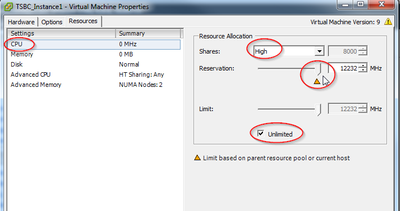
- Select 'Memory' and select the 'Reserve all guest memory (All locked)' option.
Do not click the 'OK' button yet. 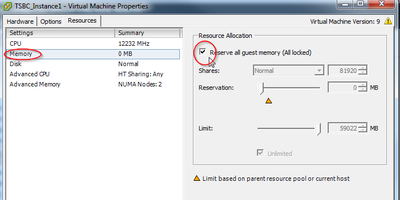
- Select 'Disk' and set the 'Shares' to 'High'.
Do not click the 'OK' button yet. 
- Select 'Advanced CPU' and set the 'Mode' to 'None'.
Do not click the 'OK' button yet. 
- Set the 'Latency Sensitivity' to 'High'
- Click 'OK'
- Return to the main screen, and select the newly instantiated virtual machine.
- Return again to the main screen, and select the newly instantiated virtual machine and click the 'Summary' tab. Once the virtual machine is completed booted, the assigned DHCP IP address will be displayed by clicking on the 'View all' button.
Note this IP address to access the Web Portal configuration interface later. 